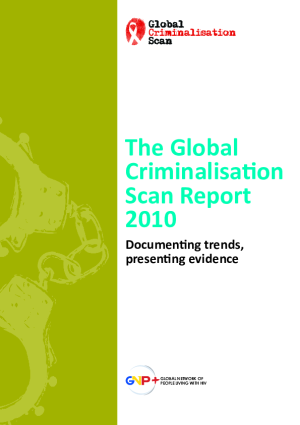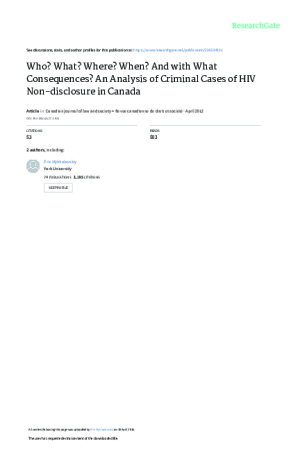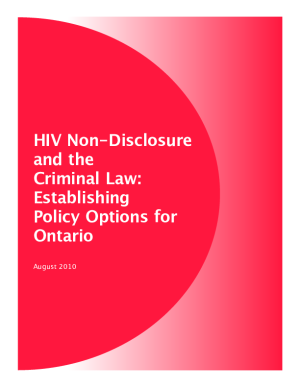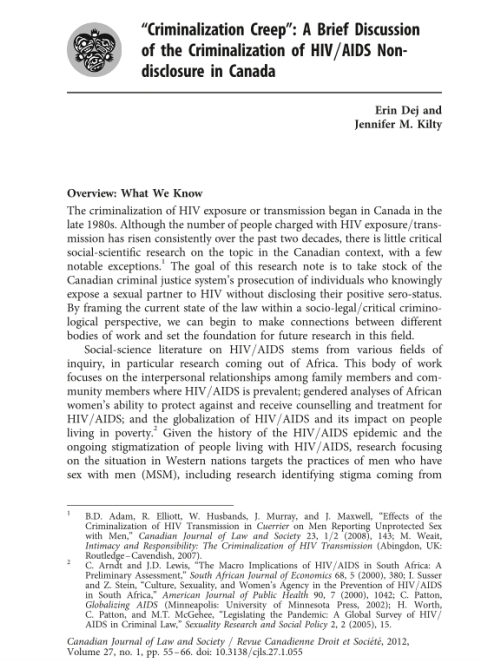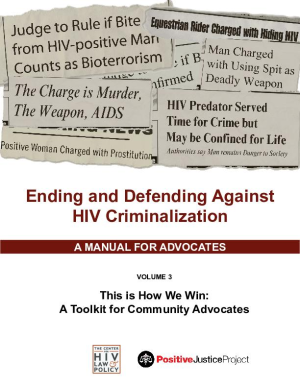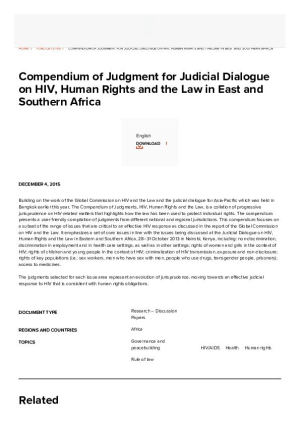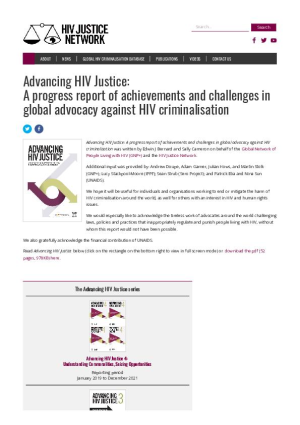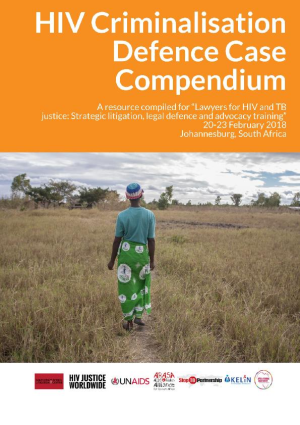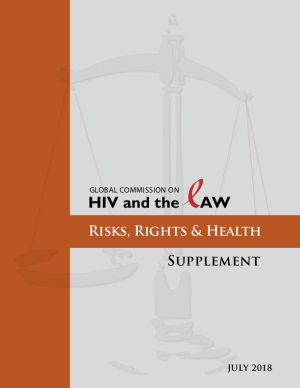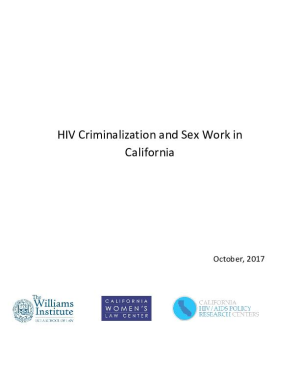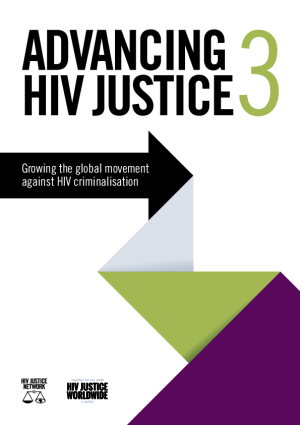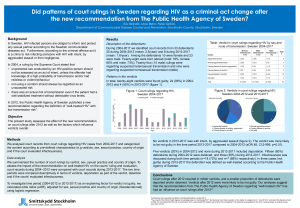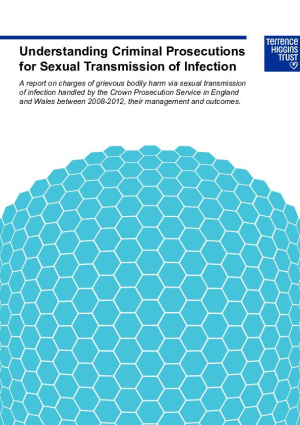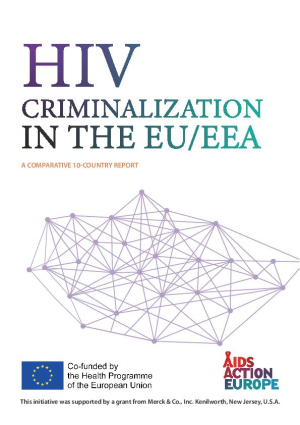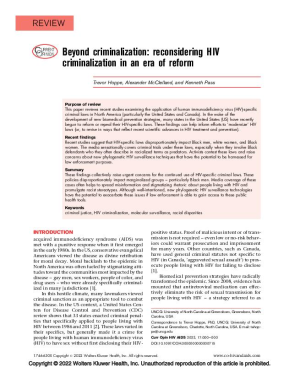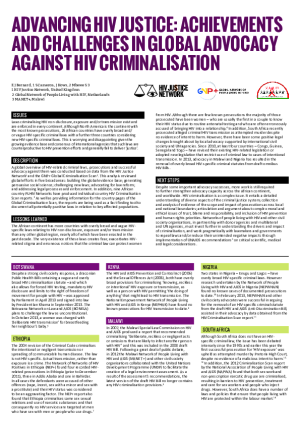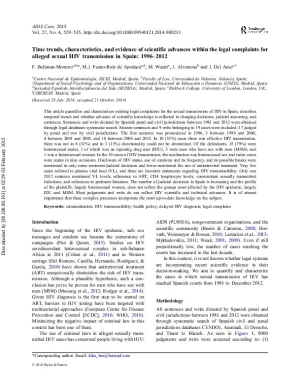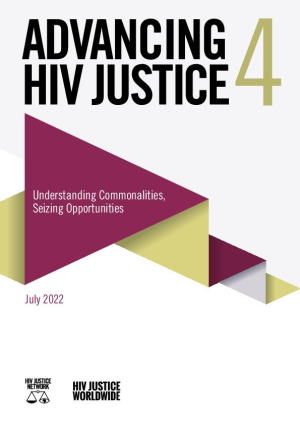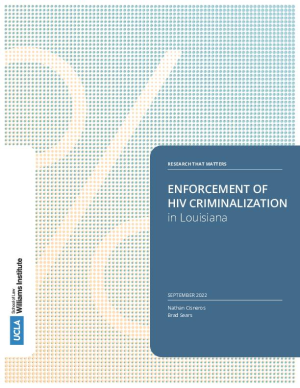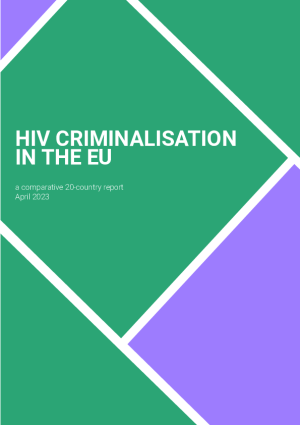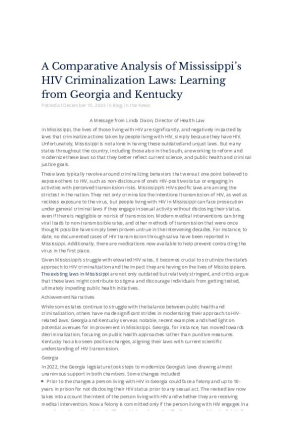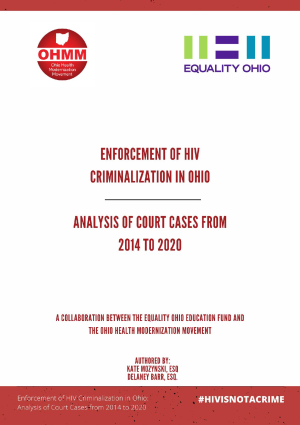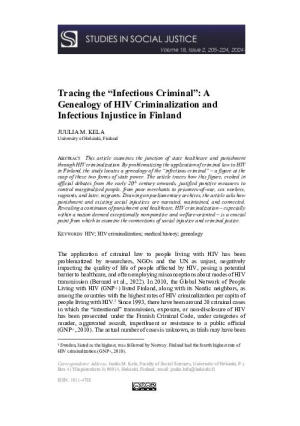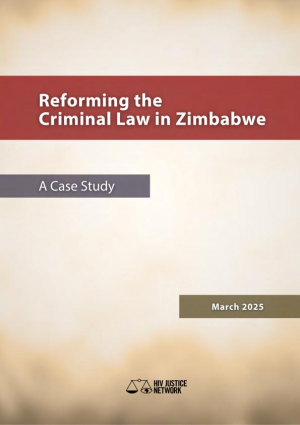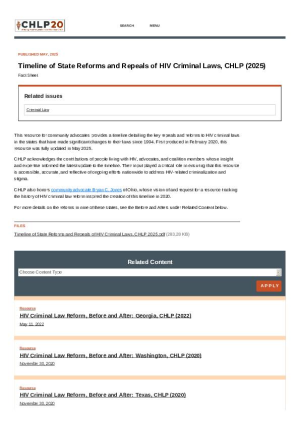Provides global overview of the extent to which criminal and other laws have been used to prosecute people living with HIV for HIV transmission and exposure.
Law, cases and legal analysis
Studies of legal developments
Who? What? Where? When? And with what consequences?: An analysis of criminal cases of HIV non-disclosure in Canada
Explores the evolution of the criminalization of HIV non-disclosure in Canada, focusing on “criminalization creep”: increasing numbers of people being charged with increasingly severe crimes.
HIV Non-Disclosure and the Criminal Law: Establishing Policy Options for Ontario
Provides an overview and analysis of criminal cases of HIV exposure and transmission to 2010, and proposes policy options for addressing the problems posed by the criminalization of HIV non-disclosure.
“Criminalization Creep”: A brief discussion of the criminalization of HIV/AIDS nondisclosure in Canada
Provides an overview and analysis of criminal cases of HIV exposure and transmission to 2010, and proposes policy options for addressing the problems posed by the criminalization of HIV non-disclosure.
Case Law Index
Listing of some U.S. HIV prosecutions by case name (to 2013), (pages 7-9)
The Compendium of Judgments, HIV, Human Rights and the Law
Includes judgements from jurisdictions around the world, representing enabling jurisprudence on HIV-related issues, including judgements related to the criminalization of HIV transmission, exposure and non-disclosure.
Advancing HIV Justice: A progress report of achievements and challenges in global advocacy against HIV criminalisation
Provides a progress report of achievements and challenges in global advocacy against HIV criminalisation during the 18 month period, September 2011 to March 2013.
Advancing HIV Justice 2: Building momentum in global advocacy against HIV criminalisation
Provides a progress report of achievements and challenges in global advocacy against HIV criminalisation from April 2013 to 30 September 2015.
- Alternative links
- Français (Traduction automatisée),
Criminalising contagion – Legislative epidemics: the role of model law in the transnational trend to criminalise HIV transmission
Explains how an epidemic of HIV criminalisation laws spread across the West and Central Africa regions enabled by model laws (the N'Djamena Model Law) drafted by USAID.
HIV Criminalisation Defence Case Compendium
This HIV Criminalisation Defence Case Compendium aims to support lawyers acting for those who are alleged to have put others at risk of HIV. Based on research conducted in late 2017, it includes criminal cases from all over the world where strong defence arguments have resulted in an acquittal or reduced penalty for persons living with HIV who have been accused of HIV exposure, non-disclosure or transmission.
The Compendium is not intended to be comprehensive. It has been developed as a resource for a training of lawyers from Africa – “Lawyers for HIV and TB justice: Strategic litigation, legal defence and advocacy training” – held in Johannesburg, South Africa from 20-23 February 2018.
Risks, Rights & Health – Supplement
This Supplement highlights developments since 2012 in science, technology, law, geopolitics, and funding that affect people living with or at risk from HIV and its coinfections. The recommendations add to and amplify those of the Commission’s 2012 report Risks, Rights & Health, which remain as relevant as they were six years ago.
HIV Criminalization and Sex Work in California
This study analyses the California Department of Justice criminal history data on arrests of people who had felony solicitation while HIV-positive from 2005 to 2013 and compared the demographics and frequencies with arrest data on sex work over the same time period. Findings indicate a clear disproportionate representation of Black women among those arrested for sex work, in the context of HIV and in general.
Advancing HIV Justice 3: Growing the global movement against HIV criminalisation
Provides a progress report of achievements and challenges in global advocacy against HIV criminalisation from 1st October 2015 to 31st December 2018.
Did patterns of court rulings in Sweden regarding HIV as a criminal act change after the new recommendation from The Public Health Agency of Sweden?
The study assesses the effect of the new recommendations from the Public Health Agency of Sweden on court rulings after 2012 as well as the factors which influence verdicts overall.
Understanding Criminal Prosecutions for Sexual Transmission of Infection
A report on charges of grievous bodily harm via sexual transmission of infection handled by the Crown Prosecution Service in England and Wales between 2008-2012, their management and outcomes.
HIV Criminalisation in the EU/EEA: a comparative 10 country report
In 2018-2019 the European HIV Legal Forum conducted a project on HIV-criminalization in 10 EU Member States (Austria, Czechia, Finland, Germany, Greece, Ireland, Italy, Portugal, Romania, and the United Kingdom). The project produced a comparative legal report based on legal survey launched in the 10 countries. One of the main findings of the project showed that regardless of scientific advance in understanding the risk of HIV infection, there is a gap between the scientific knowledge and the understanding of judges, prosecutors and police of the issue due to lack of trainings and national guidelines and media still plays an important but negative role in shaping the discussion around HIV-criminalisation thus sustaining and increasing the stigma against people living with HIV. The report also shows that HIV-criminalisation disproportionately affects key populations, women, people of colour, and the poor and homeless.
Beyond criminalization: reconsidering HIV criminalization in an era of reform
This paper reviews recent studies examining the application of HIV-specific criminal laws in North America (particularly the United States and Canada). In the wake of the development of new biomedical prevention strategies, many states in the United States (US) have recently begun to reform or repeal their HIV-specific laws. These findings can help inform efforts to ‘modernize’ HIV laws (or, to revise in ways that reflect recent scientific advances in HIV treatment and prevention).
Advancing HIV Justice: Achievements and Challenges in Global Advocacy Against HIV Criminalisation – African Update (ICASA 2013)
Although North America is the continent with the most known prosecutions, 26 African countries have overly broad and/or vague HIV-specific criminal laws and another 3 are considering enacting similar laws. This analysis reviewed global efforts in five broad areas: building the global evidence base; generating persuasive social science; challenging new laws; advocating for law reform; and addressing legal processes and enforcement.
Time trends, characteristics, and evidence of scientific advances within the legal complaints for alleged sexual HIV transmission in Spain: 1996–2012
This article quantifies and characterizes existing legal complaints for the sexual transmission of HIV in Spain, describes temporal trends and whether advance of scientific knowledge is reflected in charging decisions, judicial reasoning, and sentences.
Evaluating The Impact of Criminal Laws On HIV Risk Behavior
This article reports on the characteristics and prevalence of HIV-specific criminal exposure and transmission laws, and the enforcement of those laws through prosecutions during the period 1986-2001. It also examines the possible mechanisms through which criminal law influences behavior and considers how these might apply to the specific laws described.
Advancing HIV justice 4: Understanding Commonalities, Seizing Opportunities
Provides a progress report of achievements and challenges in global advocacy against HIV criminalisation from 1st January 2019 to 31st December 2021.
Decriminalising HIV: Strategies and best practice for legislators
This report from the Global Equality Caucus collates expert insight and best practice examples on HIV criminal law reform. In a series of case studies from around the world, where some of the Global Equality Caucus’s members have led reform efforts, the report identifies several key lessons, takeaways and overarching themes for legislators to consider.
Enforcement of HIV Criminalization in Louisiana
Using data obtained from the Louisiana Incident-Based Reporting System and from the state’s most populous parishes, this study examines the enforcement of HIV criminalization laws in Louisiana since 2011.
HIV Criminalisation in the EU – A comparative 20 country report
In 2020, AAE published a comparative 10-country report on HIV criminalisation, which provided a basis for future advocacy activities on the issue. The current report builds upon the 2020 report, while adding the data from new 10 EU Member states. The report includes information on the impact of legislation introduced during the COVID-19 pandemic, as well as trends, developments, and expected changes regarding the criminalisation of HIV.
The ABC’s of HIV law reform in Latin America and the Caribbean
We interviewed key players in the Latin American and the Caribbean region to understand what led to law reform in three countries between 2019 and 2023: Argentina (2022), Belize (2023) and Colombia (2019). While the process in each country was, and always is, a product of factors unique to the local context and cannot be replicated exactly, lessons can be drawn from these case studies that are likely to be relevant to other countries.
A Comparative Analysis of Mississippi’s HIV Criminalization Laws: Learning from Georgia and Kentucky
While some states continue to struggle with the balance between public health and criminalization, others have made significant strides in modernizing their approach to HIV-related laws. Georgia and Kentucky serve as notable, recent examples and shed light on potential avenues for improvement in Mississippi. Georgia, for instance, has moved towards decriminalization, focusing on public health approaches rather than punitive measures. Kentucky has also seen positive changes, aligning their laws with current scientific understanding of HIV transmission.
Enforcement of HIV Criminalization in Ohio
This study examines the history of HIV criminalization in Ohio and analyzes key trends in the enforcement of the state’s HIV-related criminal laws between 2000 and 2022 using data from the Ohio Incident-Based Reporting System (OIBRS) and HIV-related criminal court cases.
Enforcement of HIV Criminalisation in Ohio – Analysis of court cases from 2014 to 2020
Equality Ohio Education Fund (EOEF) and the Ohio Health Modernization Movement (OHMM) collaborated for over three years to for the first time gather data across all 88 counties in Ohio about the use of HIV Criminalisation laws and the consequences of HIV criminalization across Ohio. This effort, which is the first of its kind in Ohio, catalogs the criminal cases charged in Ohio from 2014-2020 under any of Ohio’s six statutes that criminalize or create penalty enhancements for people living with HIV.
Tracing the “Infectious Criminal”: A Genealogy of HIV Criminalization and Infectious Injustice in Finland
This article examines the junction of state healthcare and punishment through HIV criminalization. By problematizing the application of criminal law to HIV in Finland, the study locates a genealogy of the “infectious criminal” – a figure at the cusp of these two forms of state power. The article traces how this figure, evoked in official debates from the early 20th century onwards, justified punitive measures to control marginalized people, from poor merchants to prisoners-of-war, sex workers, vagrants, and later, migrants. Drawing on parliamentary archives, the article asks how punishment and existing social injustices are narrated, maintained, and connected. Revealing a continuum of punishment and healthcare, HIV criminalization – especially within a nation deemed exceptionally non-punitive and welfare-oriented – is a crucial point from which to examine the connections of social injustice and criminal justice.
Reforming the criminal law in Zimbabwe: A case study
The report, Reforming the Criminal Law in Zimbabwe: A Case Study, explores how advocates, legal experts, and community leaders worked together to repeal Section 79 of Zimbabwe’s Criminal Code, which criminalised HIV non-disclosure, exposure, or transmission. It outlines key strategies used in the campaign and lessons for other countries seeking to end HIV criminalisation.
Timeline of State Reforms and Repeals of HIV Criminal Laws, CHLP (2025)
This resource for community advocates from CHLP outlines a timeline of major repeals and reforms to HIV criminal laws in US states that have implemented significant changes since 1994. Originally released in February 2020, it was fully updated in May 2025.

